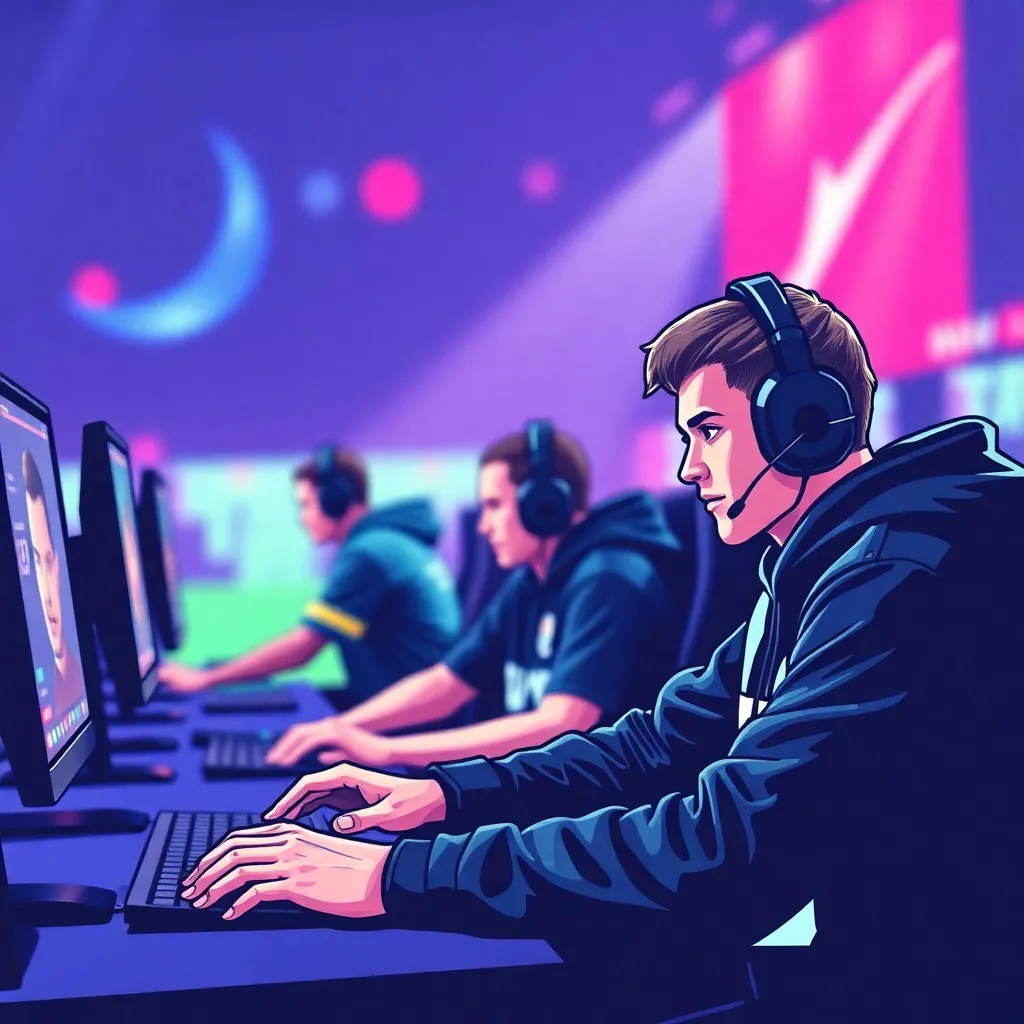In the digital age, the rise of eSports has transformed competitive gaming into a global phenomenon, elevating gamers from hobbyists to professional athletes. With the growth of eSports leagues and tournaments, eSports athletes have become influential figures in their own right. No longer just players competing in virtual arenas, they have become content creators, brand ambassadors, and social media influencers with massive fan followings.
The role of eSports athletes has evolved significantly over the past decade. Once viewed primarily as highly skilled players, they now occupy a space where gaming, entertainment, and personal branding intersect. This shift has made them powerful influencers in the gaming community and beyond. But how did this transformation take place, and what does it mean for the future of eSports and its athletes? In this article, we will explore the role of eSports athletes as they transition from gamers to influencers, examining the various factors that have shaped their journey and their impact on the broader digital landscape.
The Evolution of eSports Athletes
The journey from gamer to influencer in eSports has been shaped by the industry’s rapid growth. Competitive gaming has existed since the early days of arcade games in the 1970s and 1980s, but it wasn’t until the advent of the internet and online gaming that eSports began to gain traction on a global scale. By the early 2000s, games like StarCraft, Counter-Strike, and Warcraft III started hosting international tournaments with sizable audiences. However, the concept of eSports athletes as influencers was still in its infancy.
Fast forward to the present, and eSports is a billion-dollar industry with millions of dedicated fans worldwide. Tournaments like The International (Dota 2), the League of Legends World Championship, and Fortnite World Cup draw millions of viewers, offering prize pools that rival traditional sports competitions. Alongside this growth, eSports athletes have gained widespread recognition, and their influence has expanded far beyond the competitive scene.
The rise of streaming platforms like Twitch and YouTube has been a key factor in this evolution. These platforms allow eSports athletes to broadcast their gameplay, interact with fans in real-time, and build personal brands. Many top eSports athletes now have millions of followers on these platforms, and their influence extends beyond gaming to areas like lifestyle, fashion, and pop culture. They are no longer just gamers—they are entertainers and influencers with the ability to shape trends and opinions.
Building Personal Brands in eSports
One of the most significant shifts in the role of eSports athletes is the emphasis on personal branding. In the early days of eSports, success was measured primarily by in-game performance and tournament results. Today, while skill is still crucial, an athlete’s marketability and ability to engage with fans are equally important.
Athletes like Tyler “Ninja” Blevins, Lee “Faker” Sang-hyeok, and Oleksandr “s1mple” Kostyliev have become household names in the gaming community, thanks to their success in eSports combined with their strong personal brands. These players have mastered the art of connecting with fans through social media, and vlogs, allowing them to showcase their personalities and create a sense of community around their brands.
For example, “Ninja,” who gained fame through his mastery of Fortnite, has built an empire not only through his gaming prowess but also through his charismatic persona and his ability to engage with fans. His reach extends far beyond the world of eSports, with brand deals with companies like Adidas, Red Bull, and even appearances on mainstream television shows. He epitomizes the modern eSports athlete—one who can leverage their gaming skills to become a multi-platform influencer.
The power of personal branding in eSports is evident in the fact that many athletes now have their own merchandise lines, sponsorship deals, and even gaming organizations. They are not just players but entrepreneurs who understand the value of their influence. This shift has opened up new revenue streams for eSports athletes, making them less reliant on tournament winnings and more on their ability to market themselves effectively.
The Impact of Social Media and Streaming
Social media and streaming platforms have played a critical role in transforming eSports athletes into influencers. Twitch, YouTube, Twitter, and Instagram have provided athletes with direct access to their fans, allowing them to interact with their audience in real-time and build a dedicated following.
For many eSports athletes, streaming has become a core part of their identity. Platforms like Twitch allow athletes to showcase their gameplay, but they also provide a space for casual interaction, Q&A sessions, and even behind-the-scenes glimpses into their lives. This level of engagement helps fans feel more connected to their favorite players, fostering a sense of loyalty and community.
Moreover, the real-time nature of streaming gives athletes a platform to react to events, share opinions, and even showcase their personal lives. This blend of gaming content and personal interaction makes them more relatable and accessible to their audience. Many eSports athletes use their streams to discuss not only gaming but also topics like mental health, physical fitness, and work-life balance—issues that resonate with their audience and further enhance their role as influencers.
Social media platforms like Twitter and Instagram also allow athletes to share quick updates, highlight sponsorships, and engage with trending topics. The ability to connect with fans outside of competitive play has been essential in growing their influence. Whether it’s posting clips of their best plays or sharing their thoughts on the latest gaming trends, eSports athletes have learned to use these platforms to build their personas and keep their audiences engaged.
Sponsorships and Brand Partnerships
As eSports athletes have grown in prominence, so too has their appeal to brands looking to reach younger, digitally-savvy audiences. Sponsorships and brand partnerships have become a significant part of the eSports ecosystem, with athletes often serving as ambassadors for gaming peripherals, energy drinks, apparel, and more.
For brands, eSports athletes represent a unique opportunity to reach a highly engaged and loyal fanbase. Unlike traditional sports stars, eSports athletes are often more accessible to their fans through streaming and social media, creating a more personal connection. This makes them valuable partners for brands looking to tap into the growing gaming market.
Many eSports athletes have become the faces of major brands, securing endorsement deals that rival those of traditional athletes. For instance, “Ninja” has partnered with brands like Adidas and Red Bull, while others like “Faker” have worked with gaming hardware companies like Razer and Logitech. These partnerships are mutually beneficial, as they provide athletes with additional revenue streams while giving brands access to a dedicated and passionate audience.
In addition to traditional sponsorships, eSports athletes have also ventured into the world of content creation. Many athletes collaborate with brands to create sponsored content, such as product reviews, unboxing videos, and gameplay tutorials. This content not only promotes the brand but also provides value to the athlete’s audience, further enhancing their role as influencers.
Influencing the Next Generation of Gamers
One of the most significant impacts of eSports athletes becoming influencers is their ability to inspire and shape the next generation of gamers. Many young players look up to eSports athletes not only for their gaming skills but also for their dedication, work ethic, and ability to overcome challenges. By sharing their journeys, eSports athletes can motivate aspiring gamers to pursue their passions and work towards their goals.
The accessibility of eSports athletes through streaming and social media has also helped break down barriers between professional players and their fans. Young gamers can watch their favorite players practice, learn from their strategies, and even interact with them directly through chat. This level of engagement is unprecedented in traditional sports and has helped foster a sense of community within the gaming world.
In many ways, eSports athletes serve as role models for aspiring gamers, demonstrating that it is possible to turn a passion for gaming into a successful career. Their influence extends beyond the screen, as they often advocate for issues like mental health awareness, diversity and inclusion in gaming, and the importance of maintaining a healthy work-life balance.
The Challenges of Being an eSports Athlete and Influencer
While the transition from gamer to influencer offers many opportunities, it also comes with its own set of challenges. The pressure to maintain a strong personal brand, engage with fans, and perform at the highest level can be overwhelming for some athletes. Balancing competitive play with content creation and sponsorship obligations requires careful time management and mental fortitude.
Mental health is a significant concern for many eSports athletes, as the demands of streaming and competing can lead to burnout and stress. The constant need to be “on” for both their fans and sponsors can take a toll, especially when combined with the pressures of high-stakes tournaments. Many athletes have spoken openly about the importance of mental health and self-care, using their platforms to raise awareness and encourage their fans to prioritize their well-being.
Additionally, the rapid rise to fame that some eSports athletes experience can be difficult to navigate. Young players who suddenly find themselves in the spotlight may struggle to handle the scrutiny and expectations that come with being an influencer. The shift from playing games for fun to managing a brand can be challenging, and not all athletes are equipped to handle the responsibilities that come with their newfound fame.
The Future of eSports Athletes as Influencers
As the eSports industry continues to grow, the role of eSports athletes as influencers is likely to become even more prominent. The lines between gaming, entertainment, and personal branding will continue to blur, creating new opportunities for athletes to expand their influence and reach.
In the future, we may see eSports athletes branching out into other areas of entertainment, such as music, fashion, and even film. The skills they develop as content creators and influencers will likely open doors to new opportunities outside of gaming, further cementing their status as multi-faceted public figures.
At the same time, the challenges that come with being an eSports athlete and influencer will need to be addressed. The industry will need to prioritize the mental health and well-being of its athletes, ensuring that they have the support they need to navigate the pressures of fame and maintain a healthy balance between gaming and their personal lives.
Conclusion
The role of eSports athletes has evolved dramatically in recent years, as they have transitioned from gamers to influencers. With the rise of streaming platforms, social media, and brand partnerships, eSports athletes have become powerful figures in the digital world, influencing not only gaming but also broader cultural trends. As the industry continues to grow, eSports athletes will play an increasingly important role in shaping the future of gaming and entertainment.
The journey from gamer to influencer is full of opportunities and challenges, and the athletes who can navigate this landscape effectively will continue to thrive in the ever-evolving world of eSports.

